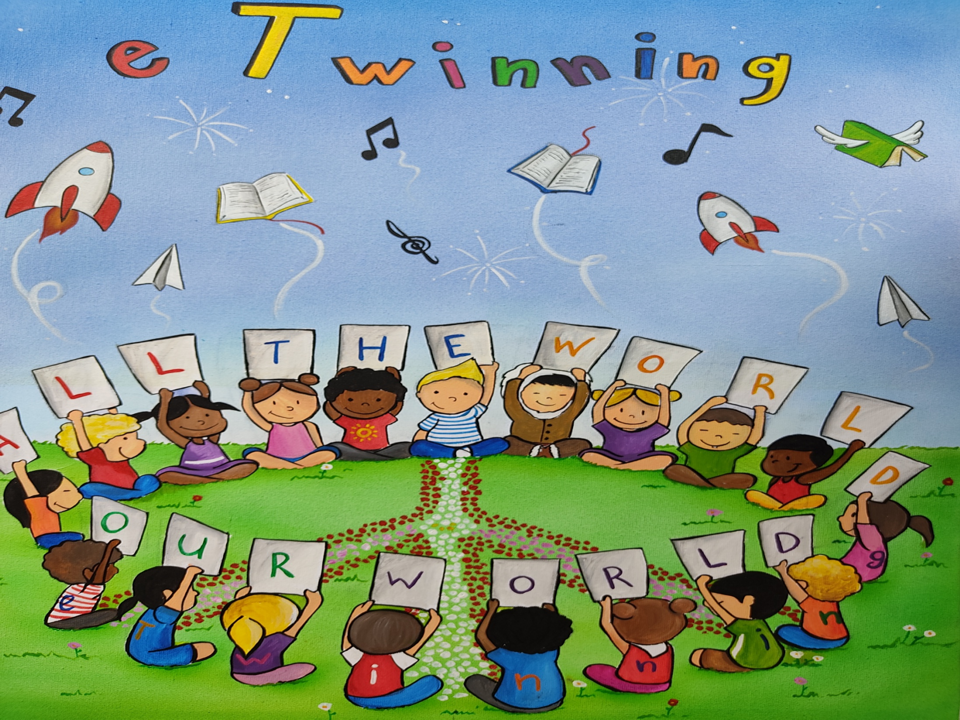According to the principles of positive psychology, people can easily recognize negative emotions but they cannot do the same with positive ones. Thus students cultivate the ability to enjoy (savoring): the ability to enjoy life. If we increase the enjoyment then we develop more positive emotions (love, happiness, tenderness, excitement, surprise, admiration). So every time we see something beautiful around us e.g. the blue sea, a meadow with poppies we should stand in front of this beautiful experience and live it with all our senses and not look simply and hurriedly and continue. So the students share with their classmates a beautiful photo and the positive emotions they experienced.
Then through art-paintings, art photos e.g Ruby’s story-the first black girl who went to a school with white students- we recognize negative emotions and learn through experiential activities how to manage them better
During this part of our project, we knew Rico Gatson, an artist who paints our inner light differently. You can read the information about Rico Gatson. The artist allowed us to break down stereotypes such as “beauty, expensive clothes, whether you are white or black determine the value of a person”
https://www.ourboox.com/books/rico-gatson/
https://app.bookcreator.com/books/ccSomuwlQGeO-32WtZipaA/BTjzEEpxRQ-DTD1f7tmXvA
https://read.bookcreator.com/Q6tBy2PAE9dRxrxndBgAYOkbFTR2/bVO3JQTqSu-194OdMqWqhg
To be happy we must not only learn to regulate positive emotions, that is, not only to live positive emotions but also to learn to keep them in our memory, to strengthen them, to extend them in time and that is what they “savoring”.
The steps to achieve this in our lives are as follows:
1. Dampening the positive emotion
A girl grew up in Chios, an island in Greece. Every spring in Chios the wild tulips come out. The girl thought it was normal, usually all over the world. She never stood to admire the tulips, to approach and enjoy their colorfulness, to forget everything ugly, and to keep more in her mind and soul this beautiful image of the field full of colorful tulips.
When she turned 18 she went to Athens to study at a University. She suddenly realizes that in the spring there were no tulips in Athens.
-Where are the tulips? asked a fellow student
-There are no tulips in Athens, said a fellow student.
-No, I want tulips. Where are the tulips? Then she realized that when she had the tulips near her, she should stand next to them, enjoy the tulips with all her senses to keep them alive, and το help her always feel positive emotions.
Positive emotions make us overcome all daily difficulties, something very useful especially in our days when we go through many bad situations with the COVID 19 which has deprived us of our freedom, hugs, communication with our loved ones…
So, take a walk in your neighborhood, in the places you can go, an image that makes you feel beautiful, filled with peace, love, joy, serenity, happiness, and upload it to our padlet.
https://padlet.com/geoklo/bt40xt4qx5u5
Sharing with others
We knew it was good to share the difficulties but what we did not know is that it is just as good to share the positives with the right people.
Share with us a beautiful moment that made you feel proud or happy or calm or satisfied …. Something that will make us feel beautiful, positive, laughing … When you share a beautiful moment with a friend, it makes your happiness double.
https://el.padlet.com/geoklo/84uddcoi7lcq
Lucky are the people who have discovered their talent or talents early. The school should therefore provide students with the appropriate opportunities to discover and develop their talents. To believe in themselves, to understand that all people have a talent, something they do better than someone or others.
https://el.padlet.com/geoklo/h52ocs6629h8
It’s time to play all together. Each of us will turn around the wheel and he/she will share with us an experience that makes him/her feel love or anger… Let’s play
https://wheelofnames.com/view/4a4-pt8/

